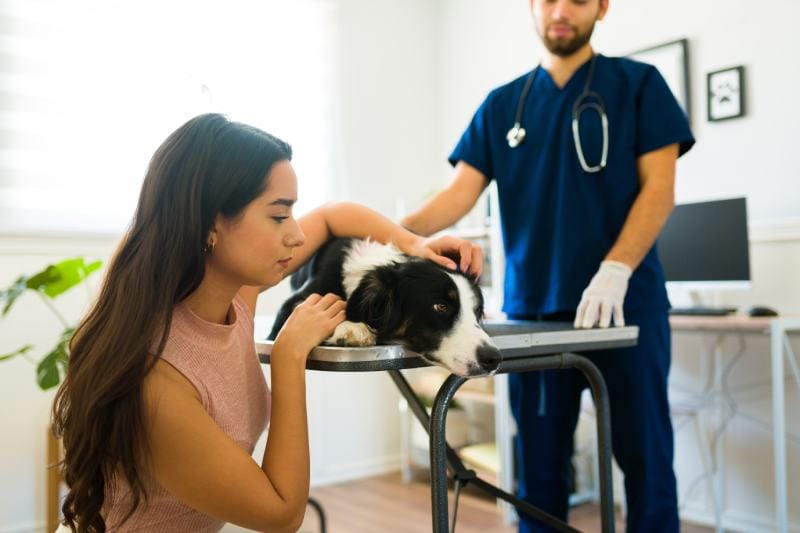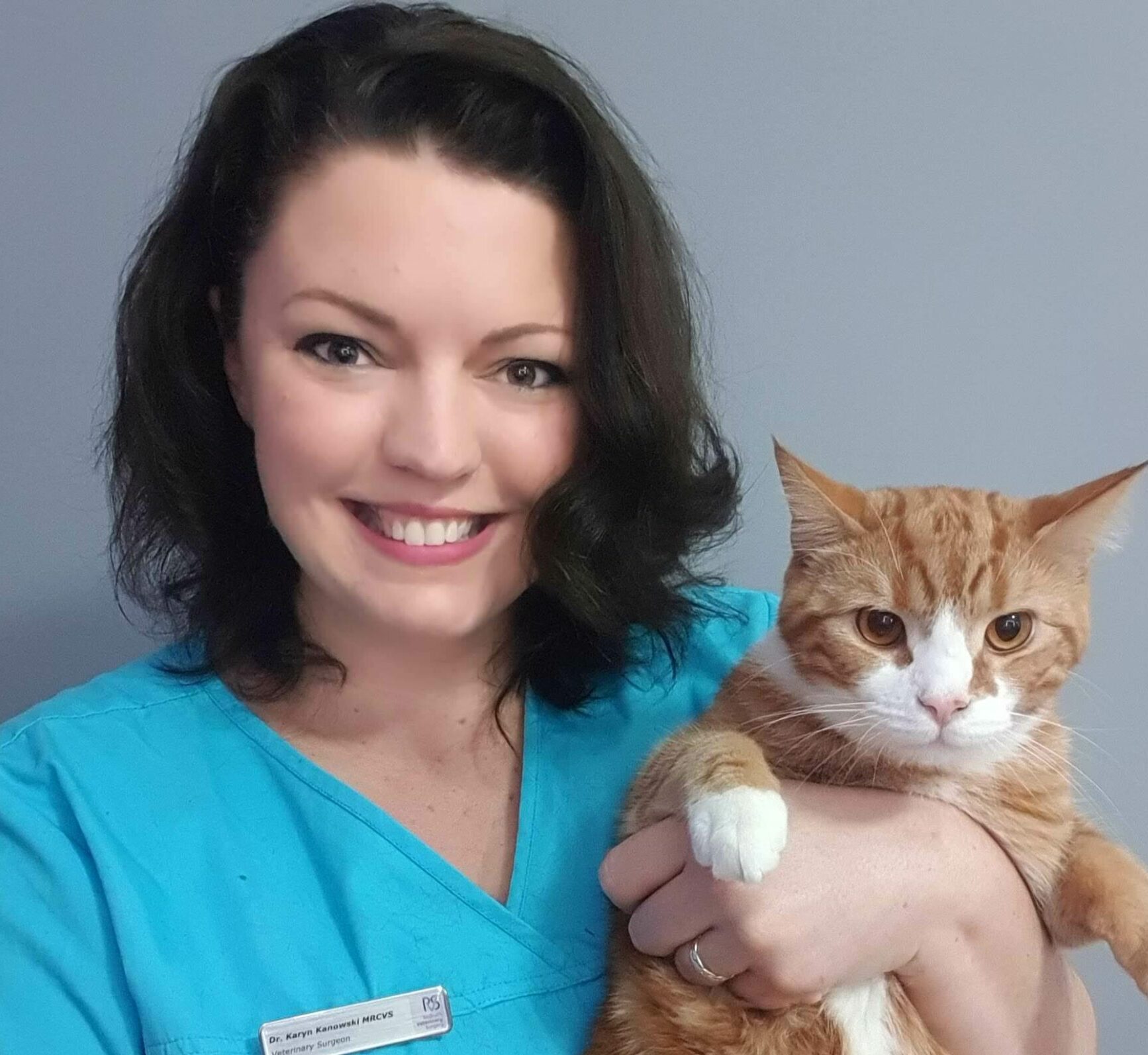How Common is Cancer in Cats? Vet Reviewed Types & Signs
By Dr. Sharon Butzke, DVM (Vet)
Updated on
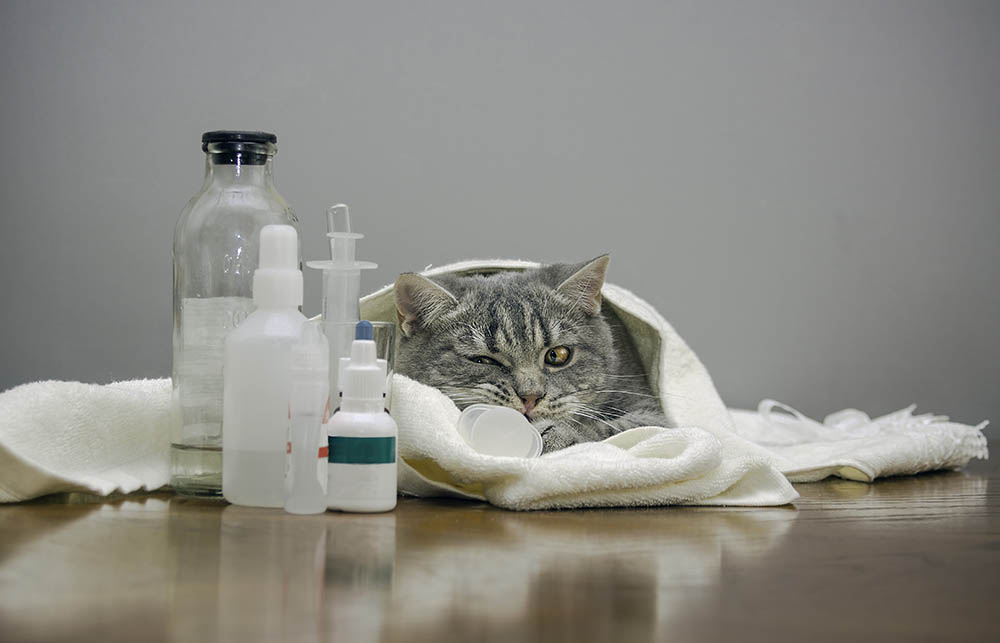
Click to Skip Ahead
Cancer. It’s a scary word to hear when talking about a loved one, whether human or fur baby. Sadly, it’s a word many cat owners will have to face.
The Flint Animal Cancer Center at Colorado State University reports that one in five cats will receive a cancer diagnosis in their lifetime, while the Cornell University College of Veterinary Medicine estimates that cancer might affect as many as 30-40% of all cats.
Currently, we have more information about cancer in dogs than cats, although in general, there hasn’t been widespread tracking of cancer in pets until recently. In May 2022, Jaguar Health Inc. launched a nationwide registry to assess the prevalence of cancer in dogs in the United States. Hopefully, an initiative like this will be available for cats in the future!
There have been a few studies over the years looking at rates and types of cancer in cats in defined geographical areas, which are summarized nicely in this article (along with explanations of why the data must be interpreted with caution).
In this article, we will discuss the most common types of cancer in cats, signs to watch for, and some steps pet parents can take to help decrease the likelihood of their cat developing certain cancers.
 What Are the Most Common Cancers in Cats?
What Are the Most Common Cancers in Cats?
The most commonly reported feline cancers (in no particular order) are:
1. Mammary (Breast) Adenocarcinoma
The Cornell University College of Veterinary Medicine estimates that mammary cancer accounts for approximately one third of all cancer in cats.
Fortunately, this type of cancer is highly preventable. Most cases occur in female cats, and spaying before the first heat has been shown to reduce the risk of mammary cancer by up to 91%. Many veterinarians recommend spaying cats before six months of age for this reason.
2. Lymphoma
Lymphoma is cancer of the lymphatic system, which includes the thymus gland, spleen, bone marrow, and mucosal-associated lymphoid tissue (MALT) found along the small intestine. It is reported to occur in 41 to 200 out of every 100,000 cats and, unlike many other cancers, affects cats of all ages. This may be because of its association with feline leukemia virus (FeLV) and feline immunodeficiency virus (FIV).
In areas where many cats are vaccinated against FeLV, the gastrointestinal (GI) form of lymphoma seems to be most common. There is growing suspicion among veterinarians that chronic inflammatory bowel disease (IBD) may predispose some cats to this type of lymphoma, which tends to occur in older cats.
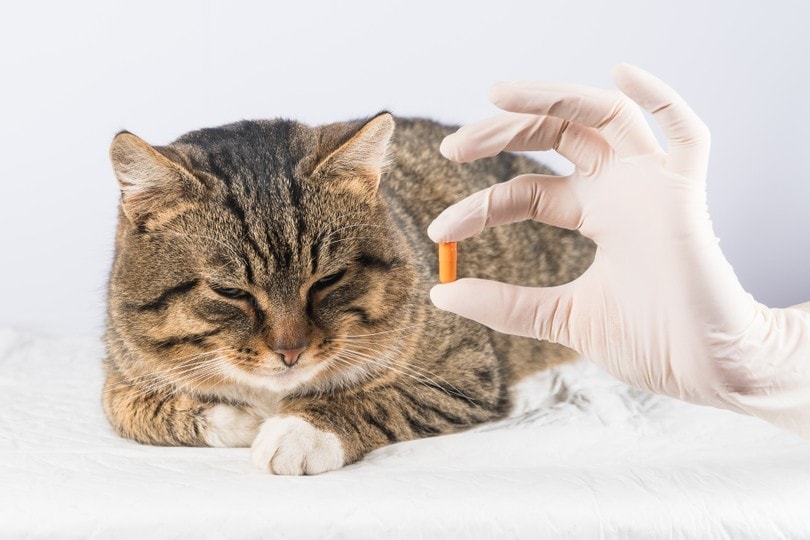
3. Squamous Cell Carcinoma (SCC)
Squamous cell carcinoma (SCC) is reported to constitute 10% of all feline cancers. It has two different forms:
Cutaneous SCC
This type of skin cancer accounts for approximately 15% of skin tumors in cats. It is very treatable if caught early, but can be fatal if it spreads to other parts of the body. The most common cause is thought to be damage from the sun’s ultraviolet rays. SCC usually occurs on parts of the face with minimal fur (think nose, lips, ears, eyelids, and temples).
Oral SCC
This form of SCC is estimated to make up 75% of oral tumors in cats. The cause is unknown at this time, and the survival rate is unfortunately very low.
A Note About Feline Injection Site Sarcomas
You may have heard claims that vaccines can cause cancer in cats. While an association between vaccination and fibrosarcomas has been identified, the most current research suggests that these tumors occur secondary to the inflammation caused by injections, rather than vaccines specifically.
Feline injection site sarcomas are, fortunately, rare. Data from the United States and United Kingdom estimate that they only occur in one out of every 1,000 to 12,500 vaccinated cats. For many cats, the benefits of vaccination likely outweigh the risk, but your veterinarian will help you make an informed decision for your individual kitty.
The American Veterinary Medical Association has a great resource for cat owners here.
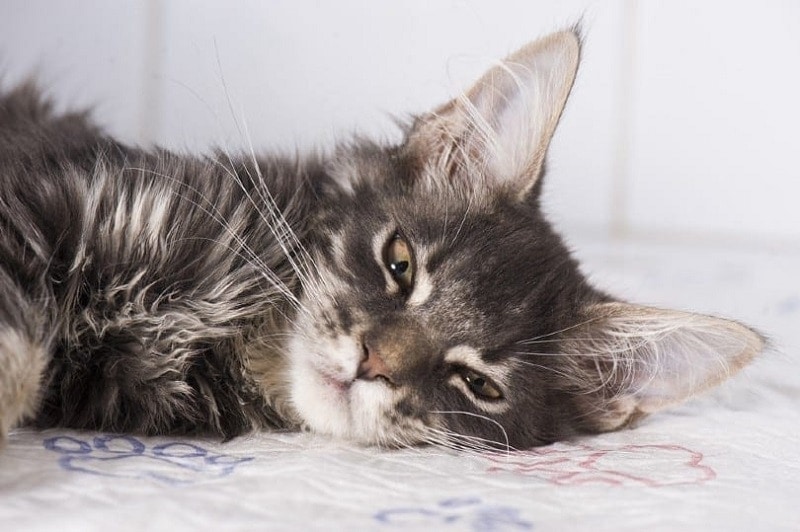
Are Certain Cats at Higher Risk of Cancer?
- Siamese cats are at increased risk of several different types of cancer, including mammary (breast) cancer, lymphoma, and small intestinal adenocarcinoma
- White and other light-colored cats may have higher risk of squamous cell carcinoma (SCC)
What Are the Symptoms of Cancer in Cats?
While a cat’s exact symptoms depend on the type of cancer they have, any of the following signs should prompt you to seek veterinary attention:
- New lumps or bumps
- Sore(s) that won’t heal
- Change in appetite (increase or decrease)
- Persistent vomiting and/or diarrhea
- Rapid weight loss
- Decreased energy
- Evidence of pain
- Difficulty breathing
- Swollen belly
- Hiding or other changes in behavior
If you are ever concerned about your cat’s health, it is best to have them checked out sooner than later. While the thought of your cat having cancer is scary, early diagnosis may mean more options for treatment, and possibly a greater chance of remission or cure.
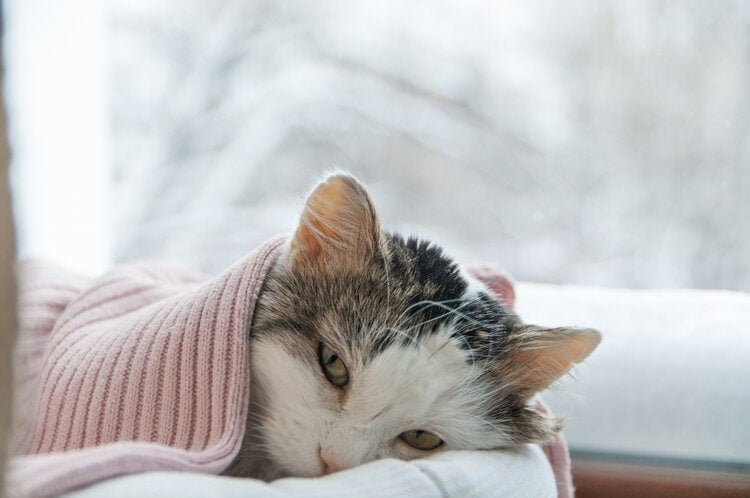
Is Cancer Treatable in Cats?
- Surgical removal of a tumor(s)
- Chemotherapy (oral or injectable)
- Radiation therapy
If your cat has been diagnosed with cancer, consider asking your veterinarian for a referral to a veterinary oncologist. Even if you aren’t sure whether you want to pursue treatment, a consultation can be very helpful. An oncologist can provide you with the most up-to-date information about options and prognosis for your cat’s particular cancer, allowing you to make an informed decision.
It is important to note that cancer treatment often requires many appointments, which can be time-consuming and stressful—for both you and your cat. It can also be very expensive! Some pet insurance plans offer coverage for cancer, which might be something to think about if you have a new kitten, or even a young adult cat at home.
Please know that deciding not to pursue cancer treatment does not make you a bad pet owner! There are many factors to consider, but the most important is whether treatment is the right choice for your cat, and your family. If you have a cat that hates going to the vet or taking medication, treatment might be miserable for them (even if their cancer has a good prognosis). It is a very personal decision.
If your cat’s cancer is already very advanced at the time of diagnosis, treatment may, unfortunately, not be an option. In these cases, your veterinarian will help you keep your cat comfortable until it is time to say goodbye.
Can Cancer Be Prevented in Cats?
While some risk factors (like age and breed) can’t be changed, there are some things you can do to reduce your cat’s risk of developing cancer:
- Do not smoke around your cat
- Help your cat maintain a healthy body weight (obesity increases cancer risk)
- Spay your female cat before their first heat cycle, or at least by one year of age, to significantly reduce their risk of mammary (breast) cancer
- Limit the amount of time white and light-colored cats spend outside, particularly at times when the sun is strongest, to minimize their risk of squamous cell carcinoma (SCC)
- Vaccinate your cat against feline leukemia virus (FeLV), because FeLV infection can increase the risk of lymphoma or leukemia
- Don’t assume that intermittent vomiting is normal; it may be a symptom of irritable bowel syndrome (IBS), which is thought to lead to gastrointestinal (GI) lymphoma in some cats
- Schedule routine veterinary check-ups (at least annually; every 6 months is a good idea for older kitties), and consider regular bloodwork to identify any changes in your cat’s health
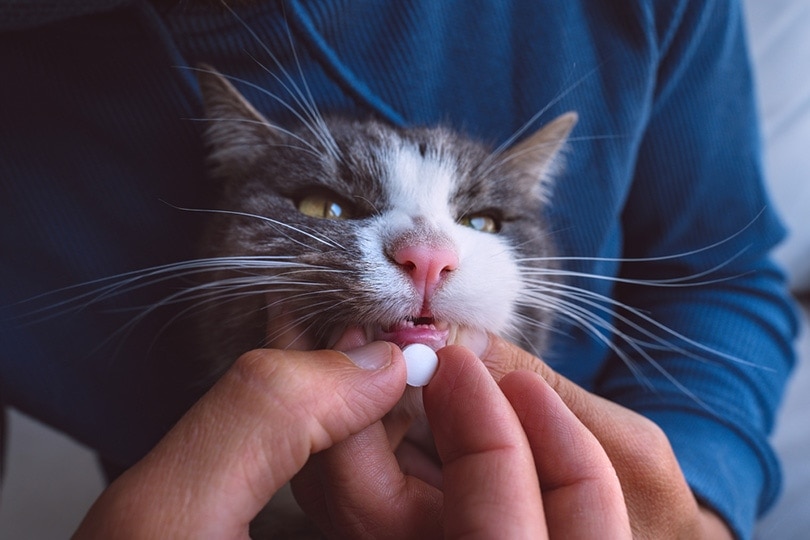
A Note About Cancer Screening
Just like in people, early detection of cancer in cats often means more treatment options and better outcomes.
Researchers are investigating feline cancer biomarkers, so keep an eye out for news related to the development of tests for early cancer detection (“liquid biopsy” is currently only available for dogs).
 Is Any Support Available for Owners of Cats With Cancer?
Is Any Support Available for Owners of Cats With Cancer?
Facing a diagnosis of cancer in your beloved cat comes with a lot of emotions, and it is normal to need some support.
Whether your cat has recently been diagnosed with cancer, is going through treatment, or has crossed over the rainbow bridge, help is available. Ask your veterinarian if they can recommend a local hotline or support group for pet owners. Alternatively, consider working with a licensed mental health professional who specializes in grief counseling.
See also:
- Ear Cancer in Cats: Signs, Causes & Treatments (Vet Answer)
- Feline Leukemia Day: When It Is & How To Participate
Featured Image Credit: Anna Nikonorova, Shutterstock

 What Are the Most Common Cancers in Cats?
What Are the Most Common Cancers in Cats?


